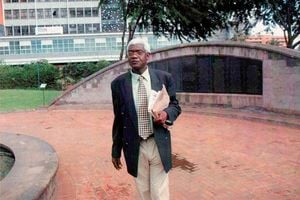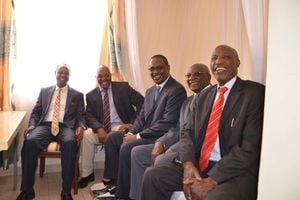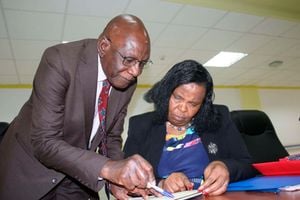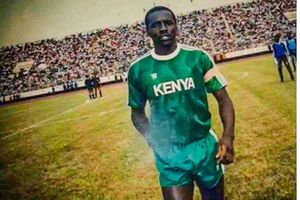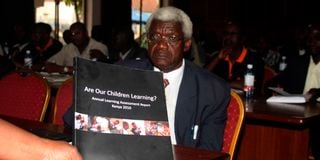
Prof Daniel Sifuna during the release of the annual learning assessment report.
As one of the many who drank from Prof Daniel Sifuna Namusonge’s calabash of knowledge, his death has left me in deep reflection on the future of the academy in Kenya and the value of we attach on generation and dissemination of new knowledge.
I met Prof Sifuna in 1985 when I joined Kenyatta University College (KUC), a constituent college of the University of Nairobi.
It was a difficult time for the country. The 1982 coup d’état had shaken the nation, and the ruling party Kanu had consolidated its hegemonic hold on power. The then-only university in the country and its constituent college were under attack from State operatives. Several scholars had been incarcerated and were serving time in jail.
We joined the university after a mandatory three-month para-military training at the National Youth Service College in Gilgil, presumably to instil patriotism in us. Across the border, the Ugandan civil war was raging and there were all indications that Kampala would fall to Yoweri Museveni’s National Resistance Movement (NRM).
Continentally, the war against the apartheid regime in South Africa had reached a fever-pitch level.
It was within this sea of chaos that we found Prof Sifuna’s fearless, critical and informed voice reassuring. As we attended his lectures in the famous Lecture Theatre 1, we noticed his passion for scholarship even at the time when the academy was under attack. He filled our young minds with curiosity and enthusiasm for critical debates. We admired his commitment for scholarship and fascination with ideas.
Prof Sifuna belongs to the generation of Kenyan scholars who did not prioritise financial gain but loved what they did. The university was then a vibrant place and a hot spot for intellectual discourses. There were scheduled weekly staff seminars which students were allowed to attend.
We enjoyed listening to him talk on a variety of topics including the newly introduced 8-4-4 system of education and the danger of ethnic mobilisation as State-sponsored tribal organisations started to sprout on campus.
Scholar par excellence
I vividly remember the day he chided his colleagues who had visited State House for handouts in one of the seminars. That was the moment I learned that, after all, it was possible to argue, differ and take a drink with colleagues afterwards. I liked to listen to Professors Sifuna, William Robert Ochieng, Henry Mwanzi, Sorobea Bogonko, James Otiende, and many others throw jabs at one another.
Prof Sifuna distinguished himself as principled man who could not sell his independence of thought for anything, and this, he made very clear.
He was a scholar par excellence and an independent thinker who hated oppression.
His strong character was built through his humble background in western Kenya. Prof Sifuna earned his bachelor’s degree in education from Makerere University and his master’s and PhD from the University of Nairobi. His self-effacing demeanour masked a wealth of knowledge that could only be discerned in his research and academic writings. An equally interesting aspect of his character is that he interacted freely with ordinary people in ordinary in places.
Perhaps Prof Sifuna’s most significant contribution was in spearheading research and discourses on education. By the time I joined university, he was already a distinguished scholar and educationist in the area of educational foundations. To say he was a towering figure in the field of education, is an understatement. He was the father of educational foundations, the mugumo tree of education in Kenya.
When Prof Sufuna believed in something, he gave it his whole. He dedicated his life to the pursuit of knowledge and the development of Kenya’s academic landscape.
At Kenyatta University, Prof Sifuna arguably left an indelible mark. Most of the educationists who studied education when Kenya had only one university went through his hands.
His dedication to scholarship was visible in his frequency to the library. He was not alone. His other colleagues including Professors Bennars, Omulando, Achola, Mudoga, Otiende and Mumbi wa Kinyati were library addicts.
Prolific researcher and writer
It is no wonder that Prof Sifuna was a prolific researcher and writer. He published widely in refereed journals on education. His books include: “Historical and Contemporary Trends in the Development of Education in Kenya”, “The Quality of Primary Education in Kenya and Education for All in Africa”, and “An Introduction to the History of Education.”
Prof Sifuna taught comparative education and helped us appreciate education systems across the world and made us identify the best practices and how they could be applied in Kenya. The tutorial sessions he conducted were enthralling.
We were particularly interested in his postulations on the expansion of education, the challenges of educational access in developing countries, and the effectiveness of curriculum reforms.
In his pursuit for excellence and steadfastness, he faced challenges with the university administration. He was not the type of person to take oppression lying down. I vividly remember the time when the university administration refused to grant him his sabbatical leave to serve in Japan. He refused to accept the oppression and resigned.
Fortunately, when he came back from Japan, there was a change of guard at Kenyatta University and the new administration agreed to re-employ him until his retirement. This is the path that many university lecturers faced especially those who were not ready to play to the mundane rules of oppressive administrators controlled by political forces. The late Prof Francis Imbuga faced the same fate and yours truly found himself in the same abyss.
As my neighbour in Kahawa Sukari, Prof Sifuna had retired to a quiet life. I have often met him doing his morning daily jog along Kahawa Sukari Avenue as I do mine.
The passing on of Prof Sifuna should make us reflect on how we run our universities and the respect we accord our distinguished professors. Equally significant, we need to reflect on the premium we attach on research in policy formulation at the national level.
Where are public lectures, inaugural lectures, seminars for exchange of ideas? Truly the mugumo tree has fallen leaving us asking questions about our role in the dearth of scholarship in the country.
Egara Kabaji, is a Professor of Literary Communication and is based at Masinde Muliro University of Science and Technology. He is also the Vice president of the Pan African Writers Association and Chairman of the Creative Writers Association of Kenya

